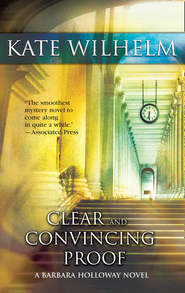По всем вопросам обращайтесь на: info@litportal.ru
(©) 2003-2024.
✖
The Price Of Silence
Автор
Год написания книги
2018
Настройки чтения
Размер шрифта
Высота строк
Поля
There was a table with two chairs. A television was high on the wall, out of reach, with a remote control on the table. A bookcase, books, magazines. A small refrigerator. No windows on the smooth walls.
She was breathing in long shuddering gasps, as if she couldn’t draw in enough air. She ran to the table and tried to lift one of the chairs. Break down the door! The chair was bolted to the floor. The table was bolted down, the remote on a chain. Desperately she looked for something to use to break the door. There wasn’t anything. She ran back to the door and tried the doorknob again and again, then pounded on it with her fists, yelling for help. She turned to face the room once more, rising panic making it hard to breathe. Her fear gave way to terror. She began to scream.
Above the door a red video camera light had gone out; Jodie was out of range. On the underside of the table, a tape recorder taped every scream until she collapsed, exhausted, when it turned itself off.
Eight
“Come on back,” Ruth Ann said on Thursday when Todd arrived. It was eleven o’clock, and Todd was ticking off the chores to be done, including checking in with Ruth Ann, before she left for shopping in Bend. A stocking cap, she had decided. One she could pull down over her ears when the wind started up again—but her choice of hat was far less pressing than it had seemed the day before. Today was like summer with a soft warm wind and hot sunshine.
Ruth Ann led the way to the dining room, where, to Todd’s surprise, there were a number of cardboard cartons on the floor, and one opened on the big dining table.
Ruth Ann waved toward the boxes. “My source material for the history,” she said. “I can’t lug all this stuff down to the office and go through it there, so I’ll set up shop right here. Are you through at the newspaper for the day?”
“Yes. Thursdays are pretty light.”
“I know. That’s when I usually did my shopping, that’s why I asked you to come up today. Todd, what I want to do is have my own computer here, one like yours, small, compact, and powerful. With a scanner and a good printer.”
Todd could see her point. Her office in town was too cluttered to handle the boxes on the floor. “We could move a computer over here,” she said.
“No, no. Those are all linked somehow, and even if I want to be tuned in from time to time, I don’t want anyone messing around with my copy. Sorry, Todd, I know you’ve done a wonderful job down there, but still I prefer a separate system.” She smiled ruefully, shook her head, then added, “Actually, I don’t want Johnny to know yet what I’m planning. He’s thinking of a one-page story for the centennial, but it keeps growing on me. That’s off the record, by the way.”
“Okay. What can I do?”
“Buy my computer and the other things I’ll need and get it up and working, teach me how to use it. I’m a good typist and that’s all I know how to do on a computer, treat it like an expensive typewriter. I hope it isn’t too much of an imposition.”
Todd grinned. “I had a long lonely weekend facing me,” she said. “This is much better. Let’s talk about what you’ll need, what you want to do, how much you’re willing to spend, if you’ll want the Internet, cable connection, DSL, or dial-up….”
Ruth Ann had a feeling that this all might take more than just a few days. They went to her sitting room and began.
When Todd left with Ruth Ann’s credit card, Ruth Ann told Maria they would invite her to dinner.
“With that table in such a mess?” Maria asked. She scowled first at Ruth Ann, then at the dining table.
Ruth Ann scowled back. “We’ll eat in the kitchen. Don’t be a scold.”
Maria was not appeased. She called Ruth Ann’s sitting room “creeping chaos,” and seemed to think that the chaos was in full gallop, threatening to run over the preacher-ready rooms. When Ruth Ann asked Thomas Bird to move a lamp stand to the table, Maria’s scowl grew fiercer.
It was after nine before Todd was ready to leave Ruth Ann’s house that night. She had done a lot with the new computer system, but more remained to be done. “Just don’t be afraid of it,” she said. “Play around, try this and that. Short of taking a hammer to it, there’s nothing you can do that I can’t undo.” She would put in a few hours at the office tomorrow and come by around one to finish installing things, she added at the door.
She hesitated, then asked, “When that mass of cold air comes in, do you feel it up here?”
Ruth Ann, sitting at the computer, became very still for a moment. “Yes. Was it terrible for you?”
“Pretty awful. I was freezing and I couldn’t get warm.”
“How about Barney? Did it affect him?”
“Some, just not the way it hit me. It’s…it’s weird.”
“Todd, no one has been able to explain it, and it’s been around all my life, just like last night. It doesn’t get worse, but it doesn’t stop, either. It appears that some of us are more affected by it than others, possibly we’re more sensitive to the sudden change. Usually outsiders hardly notice. Another sweater, or turn the thermostat up a notch and that takes care of it.”
More slowly then, she added, “Some people feel depressed, or have other emotional reactions.” She was watching Todd closely and saw her swift expression change, not to relief, exactly, but perhaps reassurance that she had not overreacted. “It used to distress me profoundly, but now I just get very cold until it passes. Don’t be alarmed, my dear. We seem to have a local phenomenon without an explanation. Like the Vortex Houses, something like that, I imagine.”
She knew she had gone too far when Todd’s expression changed again to one of polite disbelief that came and vanished quickly.
“Good enough,” Todd said. “I’ll see you tomorrow.”
Ruth Ann sat without moving for a long time after Todd left. She thought of her as almost a child, she mused, although when she was twenty-eight she had believed herself to be highly sophisticated and smarter than most people she knew. Now twenty-eight seemed still in the development stage. But Todd had felt more than cold, she knew. Her expressions hid little of what she was feeling. Still malleable, impressionable. Susceptible. Why her, an outsider? She shook herself.
For a long time she had believed the cold to be supernatural, but she had abandoned that idea when it persisted through the years without changing, without doing anything. If it was supernatural, what was its point? she had demanded of herself one day, and almost immediately after that she had gotten rid of all the books she had collected on ghostly phenomena. The cold air in Brindle didn’t fit any of the patterns, and it didn’t do anything. It just was.
But her question kept repeating: why Todd? Why had Todd felt more than an Arctic chill in the air, the way she herself always did?
Walking to the Bolton Building the next morning, Todd saw a sheriff’s car parked in front of the police station down the block from the newspaper. She entered her own building. “What’s going on with the police?”
Lou Shinizer was at his desk reading a Bend newspaper. He always looked hungry, with prominent cheekbones, somewhat sunken eyes, but his undernourished appearance was contradicted by a paunch. With black hair worn Prince Valiant–style, and steeply arched eyebrows that she suspected he kept trimmed and shaped, he looked like a man past his prime who thought he qualified for a position as a rock star or a TV personality. He hardly glanced up at her that morning. “Nothing,” he said and continued reading.
“Jodie Schuster didn’t go to school yesterday and didn’t show up last night,” Mildred said. “Her mom called the sheriff and Ollie.”
Todd glared at Shinizer. “Why aren’t you over there finding out what’s going on?”
“Told you. It’s nothing. Kid’s staying out of sight a day or two. If there’s a story, they’ll tell us.”
She wheeled about and walked out, seething.
She had described Ollie Briscoe to Barney as the Pillsbury Doughboy done in shades of red-brown, and that morning he was more red than brown when she walked into the police station. He was at his desk, and a deputy sheriff was sitting across from it.
“Morning, Todd,” Ollie said. He turned to the deputy. “This is the new girl over at the newspaper,” he added, as the deputy stood up and nodded at her.
“What’s this about a missing girl?” she asked.
“Nothing,” Ollie said. “Kid had a hassle at school, boyfriend made eyes at another girl, or her mother gave her what-for over something. She’s at a pal’s house, or her aunt’s place. Happens. Sonny’s out asking around.”
“How old is the girl?”
“Now, Todd, let’s not make a big deal out of it. Kids do this. We ask around, they show up, get time out or something. Happens.”
“How old is she and when did she go missing?” Todd’s tone sharpened.
Ollie heaved a big sigh and stood up, came around his desk, and took her by the arm. “If anything turns up, we’ll give you a call. There’s nothing here for you. Now you run along. You’re doing a real fine job over at the paper. That was a nice piece about Louise Coombs.” He was propelling her toward the door. “You just go on about your business, and we’ll get on with ours.”
She stopped moving and twisted around to look at the deputy. Fortysomething, thick in the chest, very clean looking and fair, with an expression that told her nothing.
“Why did the mother call the sheriff’s office?” she asked him. “She must think there’s more to it than a kid off pouting.”
He shrugged. “She got excited, maybe. Mothers do that.”
Todd looked from him to Ollie, then shook off Ollie’s hand on her arm and walked out stiffly. They weren’t going to tell her a damn thing, she thought furiously.






